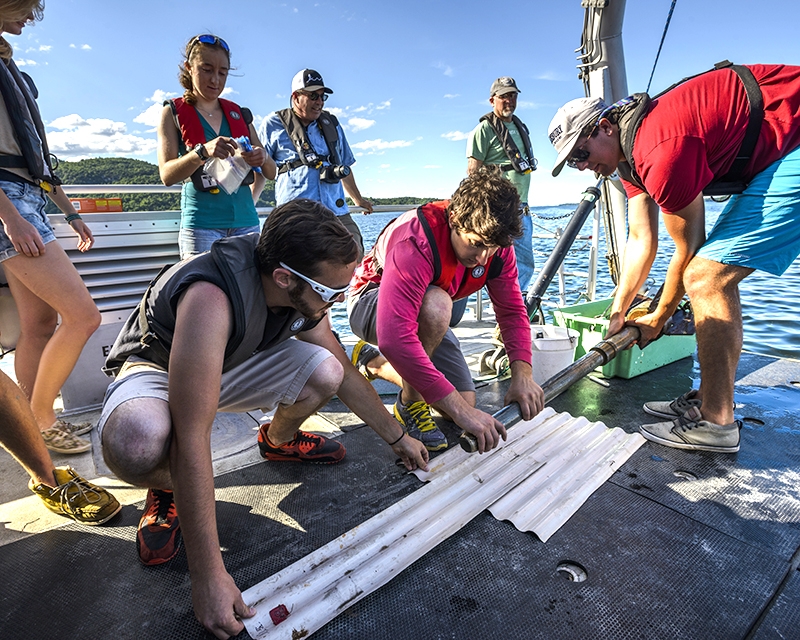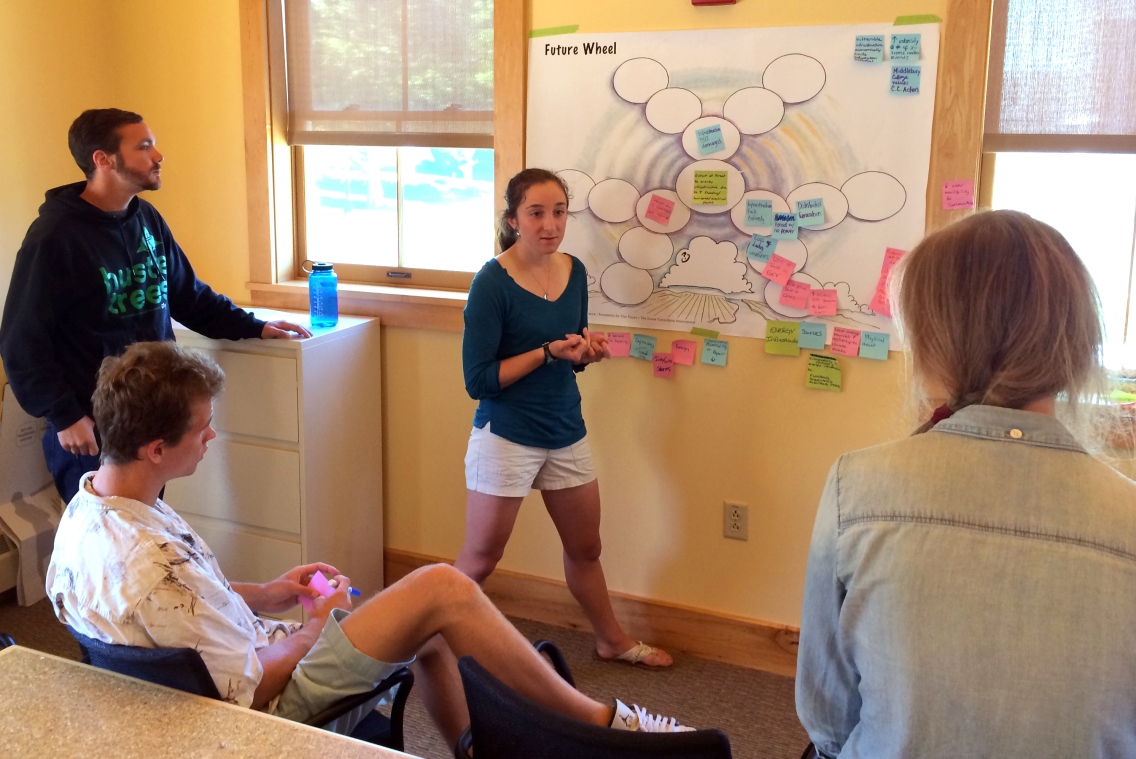School of the Environment's Debut a Success

[view:embed_content==481377]
MIDDLEBURY, Vt. — On a Friday morning in mid-July four students were huddled around a wall chart in the seminar room of Franklin Environmental Center. The students, all members of the inaugural six-week session of Middlebury’s School of the Environment (SOE), were puzzling through an exercise for one of their classes.
Using the recent Vermont climate assessment report, they were envisioning a future Vermont impacted by climate change events. The report suggested a real potential for widespread power loss, damaged infrastructure, contaminated water supplies, crop failures, and economic collapse.
“It’s hard because there are so many different aspects that can play a role in future planning,” said Joseph Interligi, a student at the University of Central Arkansas. “You have to keep in mind plausibility of these things happening, and almost everything has a plausible chance of happening.”
The students’ goal was to turn the scenarios into recommendations that Middlebury College might adopt to better prepare itself for the changes ahead. At the end of the course, each team would present its findings and recommendations to a group of professionals who would evaluate, and possibly implement, the students’ ideas.

Fellow team member Eleanor Bennett liked that their ideas could make a difference beyond the classroom. “What’s really neat is that this might become real policy at the College,” she said.
The practicum is one of three courses SOE students take, and it emphasizes the kind of complex thinking that faculty want students to develop.
“I think the big challenge the students face is recognizing how their own background experiences influence the choices they make in scenario planning,” said Catherine Ashcraft, who co-taught the course with SOE Director Stephen Trombulak. “Having a conversation with their peers about how they want to make those choices is a complicated experience.”
With an emphasis on leadership skills, the typical SOE day blended classroom work, field experience, and conversations with a diverse range of environmental professionals, who brought ideas and case studies from their careers. On this particular Friday, after their scenario planning, students immediately segued to a meeting with Bill McKibben, Middlebury’s Schumann Distinguished Scholar, and one of several practitioners scheduled to visit the school during its six-week session.
McKibben described his unlikely path from staff writer at The New Yorker to world-famous climate activist. When it was the students’ turn they seized the moment, picking McKibben’s brain for more than an hour: “Is it worth individual states pushing for carbon taxes?” (Yes, but states should band together.) “Do you alter your message depending whether you have a friendly or hostile audience?” (Not really because the facts are what they are, but I may emphasize different things depending on the audience.)
SOE students took two other academic courses, including the interdisciplinary “Understanding of Place: Lake Champlain” and a “Global Perspectives” elective.
At least weekly, they left the classroom for field work. Their Lake Champlain course was designed to help them develop a framework for understanding the complex issues of a region by studying its history, culture, economy, and ecology. They did research aboard the College’s R/V David Folger, visited historic sites, and conducted interviews with numerous stakeholders and those involved in management of the lake from the U.S. and Canada.
If the students felt burdened by their packed schedule, they didn’t show it. Most seemed to relish the problem solving and discovering the ways in which their courses related to each other.
By design, the students formed a tight cohort that followed the same schedule throughout the session. Trombulak says the shared experience among students and faculty allows them to delve much more deeply into ideas than would be possible during the regular academic year.
“So far, everything has been working beautifully—especially the students,” said Trombulak. “They have really risen to the challenge of a very intensive, immersive program. They’re making connections across the curriculum in ways that I never would have predicted.”
About the Middlebury School of the Environment
The Middlebury School of the Environment is a six-week summer immersion program sponsored by Middlebury’s renowned Environmental Studies Program. Students earn three Middlebury College credits (or the equivalent of nine semester-hour credits). The curriculum features three intensive and interdisciplinary courses designed to engage students in real environmental issues at the local level and in a global context. In keeping with Middlebury’s liberal arts tradition, courses look at the environment through the lenses of the natural sciences, the social sciences, and the humanities. Students also train in the leadership skills necessary to translate knowledge into effective social and environmental change.
—By Stephen Diehl; R/V Folger photos by Brett Simison

